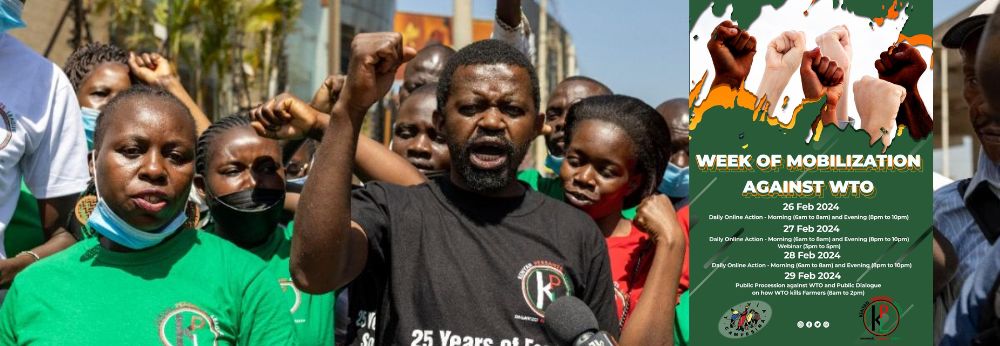Debt Crisis and Free Trade Agreements endanger Kenya’s food sovereignty: Kenyan Peasants League

As the 13th Ministerial Conference of the World Trade Organization (WTO) is scheduled to commence on February 26th, peasant movements worldwide are highlighting how free trade deals and the ongoing debt crises in various countries pose a significant threat to people’s ability to control their own food production. In this audio excerpt, David Otieno from the Kenyan Peasants’ League, speaking at a seminar on Debt Crises, underscores this link by referencing the several Free Trade Agreements, which now permit cheap imports of pesticides, eggs and sugar.
In January 2024, the KPL also became part of the opposition against the EU-Kenya Economic Partnership Agreement (EPA). By signing a letter alongside other members of civil society addressed to European Parliamentarians, the Kenyan Peasant League endorsed the viewpoint that utilizing agricultural resources like land and water primarily for export purposes impedes Kenya’s ability to prioritize agriculture that allows for reducing its reliance on imports such as grain.
“Firstly, the EPA with the East African Community, on which the EU-Kenya agreement builds, failed to be ratified in 2016, with EAC member states recognizing that local industries would not be able to withstand competitive pressures from EU firms, locking the region even further in its role of provider of low-value-added primary commodities. It was calculated that the welfare in the EAC would decrease while the EU would register a welfare gain of $212 million” the letter noted.
It also elaborated how, considering Kenya is part of the customs union of the EAC -which ensures free flow of goods between the countries-, the enforcement of the agreement would lead to a flow on European goods to all EAC countries through Kenya, given the difficulty to enforce rules of origin and the safeguards that the partners have introduced into the text.
For instance, Cote D’Ivoire and Ghana implemented an interim EPA with the EU, facilitating the influx of milk powder into these countries. Consequently, the capacity of countries like Burkina Faso, Nigeria, and Senegal—despite not signing an EPA but being in a customs union with Cote D’Ivoire and Ghana—to meet their milk consumption needs through domestic production has decreased significantly over the past two decades. Specifically, it declined from 80% to 69% for Burkina Faso, from 41% to 21% for Nigeria, and from 33% to 21% for Senegal. The competitive pressure stemming from cheaper milk powder, which enters these countries via processed goods, undermines their ability to ensure food security.
Read the full text of the letter here.
This post is also available in Français.
